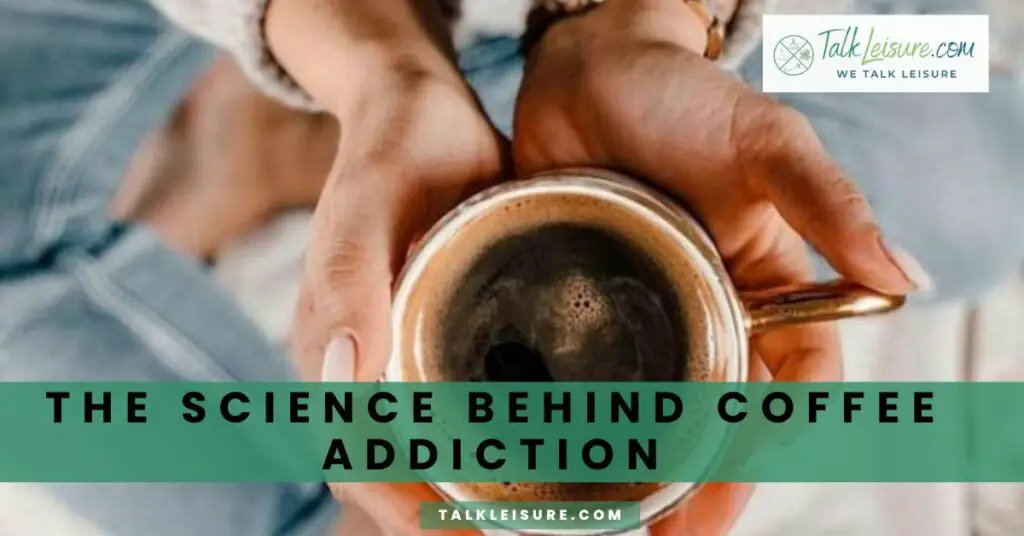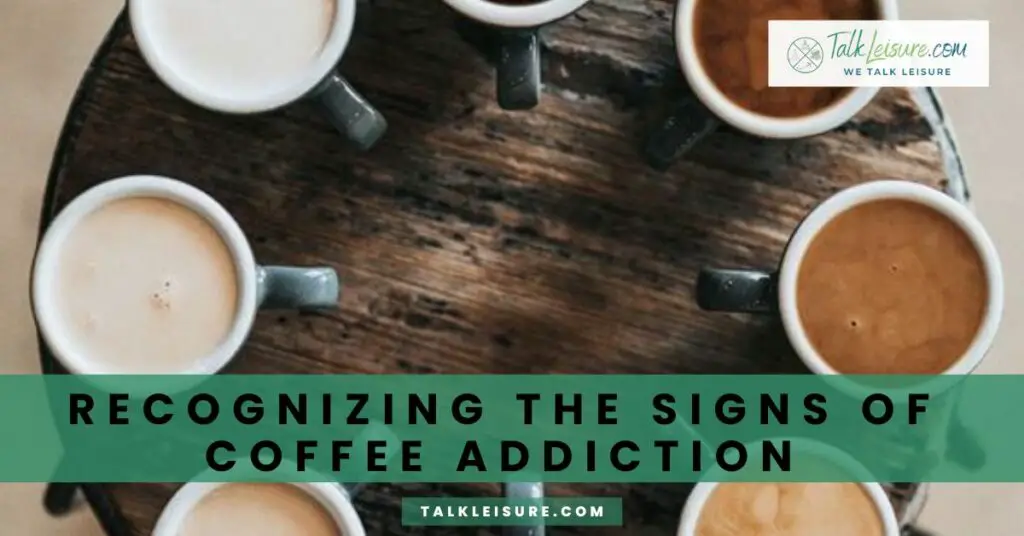As a coffee lover myself, I understand the enticing aroma and the energizing effects that a steaming cup of java can bring.
However, it’s important to take a closer look at the dark side of coffee addiction and its impact on our lives.
Coffee addiction is a real phenomenon that affects millions of people worldwide. The constant consumption of caffeine can lead to dependence, making it challenging to function without a daily dose of the black elixir.
This addiction can have negative effects on our physical and mental well-being.
Can coffee addiction become as serious as drug addictions?
The Science Behind Coffee Addiction

As a coffee enthusiast, I can’t deny the allure of that rich aroma and the instant energy boost that a cup of coffee provides.
But it’s essential to understand the science behind coffee addiction and how it affects our brains and bodies.
Understanding the Physical and Psychological Aspects of Addiction
Physically, coffee addiction can lead to symptoms such as headaches, restlessness, and increased heart rate.
Dependency on caffeine often disrupts sleep patterns, leading to fatigue and irritability.
On a psychological level, coffee addiction can create a need for the stimulating effects of caffeine to feel alert and focused.
This dependency can affect our ability to concentrate, our mood stability, and even our overall productivity.
How Caffeine Affects the Brain and Body
Caffeine, the primary psychoactive ingredient in coffee, stimulates the central nervous system, blocking adenosine receptors in the brain.
This action prevents us from feeling tired and increases alertness.
However, this temporary boost comes at a cost.
When consumed regularly, caffeine can lead to physical and psychological dependence.
It stimulates the release of dopamine, a neurotransmitter associated with pleasure and reward, creating a pleasurable sensation that reinforces the desire for more coffee.
On a physical level, coffee addiction can lead to symptoms such as headaches, restlessness, and increased heart rate.
The withdrawal symptoms when trying to quit can be challenging, including fatigue, irritability, and difficulty concentrating.
Psychologically, coffee addiction can create a reliance on caffeine to feel alert and focused.
This dependency can affect our concentration, mood stability, and overall productivity, making it crucial to be mindful of our caffeine intake.
8 Best Non-Dairy Alternatives for Your Coffee
Recognizing the Signs of Coffee Addiction

Increased tolerance: Have you noticed that one cup of coffee no longer gives you the same boost it used to? That’s a sign that your body has developed a tolerance to caffeine, and you may be reaching for more coffee to get the same effect.
Withdrawal symptoms: Do you experience headaches, fatigue, or irritability when you try to cut back on coffee? These are withdrawal symptoms that occur when your body is dependent on caffeine.
Difficulty reducing coffee intake: If you find it challenging to cut back on coffee or resist the urge to drink it, it’s a clear indication of addiction.
Using coffee to cope: Are you relying on coffee to deal with stress, anxiety, or low energy levels? Using coffee as a crutch instead of addressing the underlying issues can be a sign of addiction.
Neglecting other aspects of life: Are you prioritizing coffee over other activities or relationships? If coffee is interfering with your daily life and causing disruptions, it’s time to take a step back and evaluate your relationship with it.
The Health Consequences of Coffee Addiction

As someone who has experienced the allure of coffee addiction, I understand firsthand how it can take a toll on your physical health.
While that morning cup of joe may provide a temporary boost, excessive coffee intake can lead to a range of health issues.
First and foremost, caffeine is a stimulant that can cause an increase in heart rate and blood pressure.
This puts additional strain on your cardiovascular system, increasing the risk of heart problems in the long run.
Excessive coffee consumption can lead to digestive issues such as acid reflux, stomach ulcers, and irritable bowel syndrome.
Another concern is the impact on your bones.
Studies have shown that too much caffeine can interfere with calcium absorption, potentially leading to weakened bones and an increased risk of osteoporosis.
Mental Health Impacts – Effects on Sleep Patterns
Coffee addiction doesn’t just affect your physical health; it can also have a significant impact on your mental well-being. The high levels of caffeine found in coffee can disrupt your sleep patterns, making it harder to fall asleep and achieve restful sleep. This, in turn, can lead to increased anxiety, mood swings, and irritability during the day.
Additionally, excessive caffeine consumption can contribute to feelings of restlessness and even exacerbate symptoms of anxiety disorders.
It’s important to recognize the potential health consequences of coffee addiction and take steps to regain control.
Moderation is key, and finding healthier alternatives or reducing your caffeine intake gradually can help you restore balance to your physical and mental well-being.
Remember, your health is precious, and making conscious choices about your coffee consumption can go a long way in preserving it.
Coffee Addiction- Tips for Cutting Back
As someone who has experienced the allure of coffee addiction, I understand how challenging it can be to cut back on your caffeine intake.
However, taking steps to address your coffee addiction is crucial for both your physical and mental well-being.
Here are some strategies that can help you reduce your coffee consumption:
Gradual reduction: Instead of quitting coffee cold turkey, try gradually decreasing your intake. Start by replacing one cup of coffee with a healthier alternative, such as herbal tea or decaf coffee. Over time, continue to reduce the number of cups until you reach a comfortable level.
Set limits: Establish a coffee consumption limit for yourself. This can be a certain number of cups per day or a specific time in the morning when you allow yourself to have coffee. Stick to these limits to regain control over your caffeine intake.
Find alternatives: Explore healthier alternatives to coffee that can still provide a morning boost. For example, try matcha green tea, which contains less caffeine but still offers a natural energy boost. You can also experiment with herbal coffees or chicory root blends as a coffee substitute.
Establish a routine: Create a morning routine that doesn’t revolve around coffee. Engage in activities such as stretching, meditation, or a light workout to wake up your mind and body without relying on caffeine.
Seek support: If you’re struggling to cut back on coffee, don’t hesitate to seek support from friends, family, or even professional resources. Sharing your goals and challenges with others can help you stay accountable and motivated.
Conclusion
As someone who has personally experienced the challenges of coffee addiction, it’s important to acknowledge the complex nature of this struggle.
Coffee addiction is more than just a habit or a desire for a morning pick-me-up; it is a real addiction with profound impacts on our health and well-being.
Excessive consumption of caffeine can lead to a range of negative effects, including sleep disturbances, increased heart rate, anxiety, and digestive issues.
But it doesn’t stop there.
The reliance on coffee for energy can create a vicious cycle of dependency, where we feel the need for more caffeine just to function properly.
Recognizing the depth of this problem is crucial, but equally important is seeking professional help when needed.
Healthcare providers or addiction counselors have the expertise and resources to guide us through the process of overcoming coffee addiction.
They can provide personalized plans to gradually reduce caffeine intake and offer strategies for managing withdrawal symptoms.
Remember, you don’t have to face coffee addiction alone.
Seeking support from professionals can significantly improve our journey towards a healthier relationship with caffeine.
Together, we can break free from the grip of coffee addiction and reclaim our well-being.
Frequently Asked Questions
Is coffee addiction a real thing?
Yes, coffee addiction is a real and recognized condition. It is classified as a behavioral addiction, characterized by a strong craving for coffee and an inability to control or stop its consumption. Just like any other addiction, it can have significant impacts on an individual’s daily life, relationships, and overall well-being.
How much coffee is considered excessive?
The amount of coffee that is considered excessive varies from person to person. Generally, it is recommended to limit daily caffeine intake to no more than 400 milligrams, which is approximately 4 cups of coffee. However, it is important to note that some individuals may be more sensitive to caffeine and may experience negative effects even with lower amounts.
What are the withdrawal symptoms of coffee addiction?
When attempting to quit or reduce coffee consumption, some individuals may experience withdrawal symptoms. These can include headaches, fatigue, irritability, difficulty concentrating, and even flu-like symptoms. Withdrawal symptoms typically peak within 24-48 hours after the last caffeine intake and may last for a few days to several weeks.
How can I reduce my dependence on coffee?
Reducing dependence on coffee can be challenging, but it is possible with determination and support. Gradually decreasing caffeine intake, substituting coffee with decaffeinated alternatives, and implementing healthy lifestyle practices such as regular exercise, adequate sleep, and a balanced diet can all contribute to breaking the cycle of coffee addiction.
When should I seek professional help for coffee addiction?
If you find that your coffee addiction is significantly impacting your daily life, relationships, or mental and physical health, it may be beneficial to seek professional help. Healthcare providers or addiction counselors can provide personalized guidance, support, and resources to help you overcome coffee addiction and establish a healthier relationship with caffeine.Remember, everyone’s journey towards overcoming coffee addiction is unique, and it is important to be patient and kind to yourself throughout the process. Seeking support and adopting healthy habits can make a significant difference in breaking free from the grip of coffee addiction and reclaiming your well-being.
Best Wishes!






